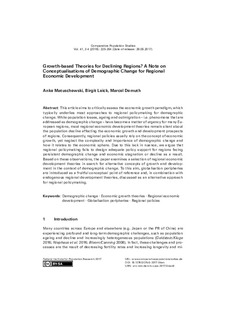Growth-based Theories for Declining Regions? A Note on Conceptualisations of Demographic Change for Regional Economic Development
Journal article, Peer reviewed
Published version

View/
Date
2016Metadata
Show full item recordCollections
Abstract
This article aims to critically assess the economic growth paradigm, which typically underlies most approaches to regional policymaking for demographic change. While population losses, ageing and outmigration – i.e. phenomena that are addressed as demographic change – have become a matter of urgency for many European regions, most regional economic development theories remain silent about the population decline affecting the economic growth and development prospects of regions. Consequently, regional policies usually rely on the concept of economic growth, yet neglect the complexity and importance of demographic change and how it relates to the economic sphere. Due to this lack in nuance, we argue that regional policymaking fails to design adequate policy support for regions facing persistent demographic change and economic stagnation or decline as a result. Based on these observations, the paper examines a selection of regional economic development theories in search for alternative concepts of growth and development in the context of demographic change. To this aim, globalisation peripheries are introduced as a fruitful conceptual point of reference and, in combination with endogenous regional development theories, discussed as an alternative approach for regional policymaking.